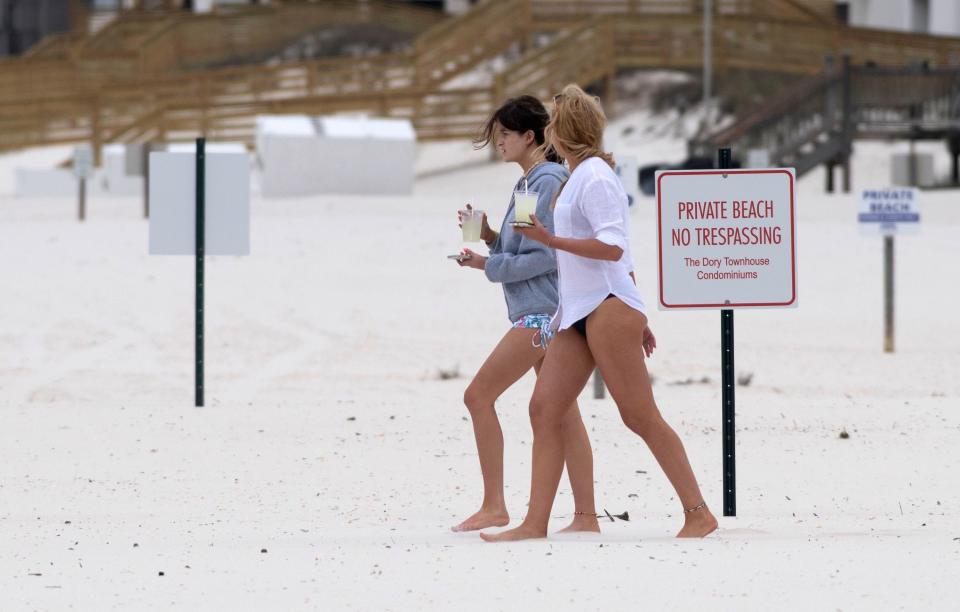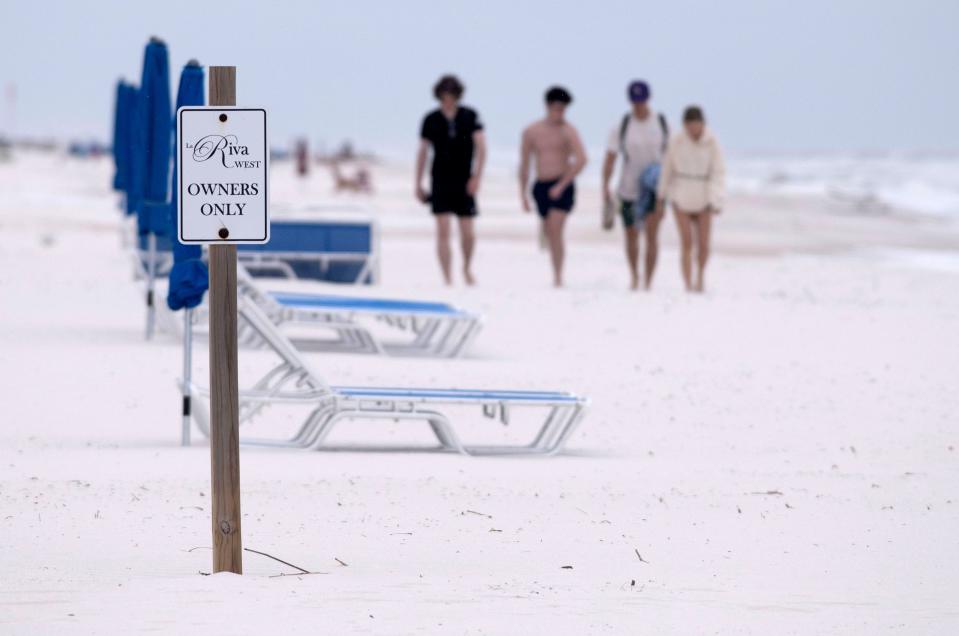Old deeds give new life to the fight for public access to Perdido Key beaches
The original deeds for dozens of Gulf-front properties on Perdido Key in Escambia County could open up at least nearly 2 miles of beach to the public that had previously been claimed by private property owners.
The wording on the nearly 70-year-old public documents indicates the U.S. government, which originally owned the land before selling it, intended for large portions of the beach to remain open to the public.
The deeds resurfaced after an Escambia County man, Mike McCormack, began researching where, exactly, the public was allowed to go on Perdido Key beaches designated as private. Currently, the public is barred from most of the beach on private property areas and is required to stay near the high-water mark.
“It’s a common understanding that the high-water line just means wet sand,” said McCormack. “That’s all we have access to, is the wet sand and if you’re a family and you want to go out to the beach, it’s kind of hard to do when you have to set up in wet sand. You can’t keep anything dry and there’s all that dry sand they can’t use. I got to thinking there has to be something that’s going to designate where this is or how it can be determined.”

Related: Judge rules public beach access in Perdido Key can stay open to the public
Tragedy at Perdido Key: Bryce Brooks: Family honors Atlanta teen who died saving kids from drowning at Perdido Key
He dug through maps and surveys and discovered references to a 75-foot public easement on a beach-front property. McCormack made a public information request to Escambia County Commissioner Jeff Bergosh for the legal documents that specifically described the easement and that’s when he and county staff found the original deeds for 64 properties sold to individuals by the federal government.
Each of the deeds, some dating back to 1957, contains the same language that the southerly 75 feet of the Gulf front lots were “subject to a perpetual assessment for a beach for public use generally.”
McCormack, who grew up fishing and sunbathing on Perdido Key, was thrilled about the discovery and what it could mean for public access on the beach, which he has fought to keep open.
“To say it was an eye opener for me was an understatement,” said McCormack. “I’m optimistic that our access to the beach will be restored. That was something that was in the deed. It’s in perpetuity, it’s supposed to be there forever and not to be taken away.”
Escambia County Commissioner Jeff Bergosh has also fought for more public beach access on the key and he's encouraged about the discovery.
“In looking at all 64 deeds, the federal government’s intent was crystal clear,” said Bergosh. “The same language is on each and every one of them, and that’s 75 feet from the beach north is supposed to be public beach access easement. It was always supposed to be there.
“It’s going to beg a lot of questions,” he continued, “but for me the most important part is how do we lawfully take it back, repatriate it, and liberate it so that the citizens who were always supposed to have access to it can now once again regain access to it and utilize it for their benefit as the federal government intended with that language in all 64 deeds.”

Condominium associations have taken the county to court over exclusive use of what they say is private beach property, including suing to stop the use of what’s known as Public Beach Access No. 4 on Perdido Key. A judge recently ruled in the county’s favor to keep it open to the public, but the resurfacing of the original deeds could reshape the future of the beach.
“It has been a battle,” said Bergosh. “The condominium owners are convinced that this is their private property from the street all the way down to the wet sand and many of them have put signs going all the way down the beach — connected with ropes and chains in some instances — and they’ve actively hired off duty sheriff’s deputies to prevent any citizen from coming on to what they believe was their private property. Now come to find out it looks like a lot of that property they had signs on and guards protecting was supposed to be a part of this 75-foot easement. It’s very troubling, it’s very angering, I don’t know how they got away with it. My questions are who perpetrated this and who perpetuated it over decades?”
In case you missed it: Escambia Fire Rescue pulls 8 people from Perdido Key waters within hours of each other
In other news: Escambia, Santa Rosa ready for 5,000-mile-wide sargassum blob moving toward Florida
Bergosh said he has consulted with legal staff who want to do some additional title searches, but he said the results are encouraging for public access. He also compared the sale of the beach properties to getting a deal on a used car until the police come to claim it from the owner because it turns out be stolen. Based on the deeds, he said property owners never should have had it in the first place.
"A lot of these condo owners probably were unaware of this," said Bergosh, "and worse than that many of them were probably sold a bill of goods, ‘Yeah, this is private property all the way to the beach. It’s your own private, exclusive beach.’ Who knows if the prices were inflated because of that exclusivity, so a lot of them are going to feel like they got duped, a lot of them are going to feel like they’ve had something taken away from them."
The Perdido Key Association represents property owners and president Charles Kruponic says owners will likely be extremely disappointed by the deed development. He said many condo owners paid premium prices for private beach access and the change could also affect what some can charge for rentals.
“There have been decades of title turnovers and legal reviews of the property. What needs to happen now is property owners need to have an opportunity to research this on their own and see how they got to the current circumstance where we presume that they have private property rights all the way to mean high-water line,” Kruponic explained. “I hope the county doesn’t immediately implement that finding. There should be a process whereby property owners and other interested individuals have an opportunity to search this issue, as well.”
Perdido Key Chamber president Tammy Thurow said there’s no doubt this will be controversial.
“There is the group that doesn’t want to share their beach, because they are the condo owners,” Thurow said, “but then you have the visitors, and we all need to be pro-visitors because that’s what pays the bills around here, so it’s like what does that look like to the visitors if they see ‘no trespassing’ signs on the beach.”
Both Bergosh and Kruponic expect there will be a legal battle if the county pushes to take back what was thought to be private beaches for public use. They expect a number of property owners will also take a hard look at their title insurance companies.
“I don’t think there’s a legal way to extinguish a perpetual easement from a government that was made as a condition of accessing an easement,” said Bergosh. “I think some people did effectively try to do it and as of today, that’s getting blown up. That’s getting blown up like a nuclear bomb and I’m quite happy to lead the charge to do it.”
If what are now private beaches do become open to the public, Bergosh said it will mean more resources for the beach including lifeguards, parking and beach access areas. Mike McCormack has also been fighting to keep Perdido Key beaches open to the public so others can enjoy the area’s natural beauty like he and his family have for decades, until private property owners began blocking access.
He said the implications of what they found in the old deeds could have far reaching implications.
“In my opinion, I should be able to walk out there on the beach right now and park my butt anywhere I want as long as I’m within 75 foot of that water’s edge,” said McCormack, “because it was deeded that way to begin with and in my limited understanding, in order to repeal that, because it was granted by the federal government, you had to go before Congress to get it repealed. Any government, any local government that has had a property transfer from the federal government for whatever reason, it would behoove them and their citizens interests to see if there is any covenants, conditions or restrictions that the government placed on that property at the time of sale.”
This article originally appeared on Pensacola News Journal: Perdido Key public beach access may expand with newly-discovered deeds

